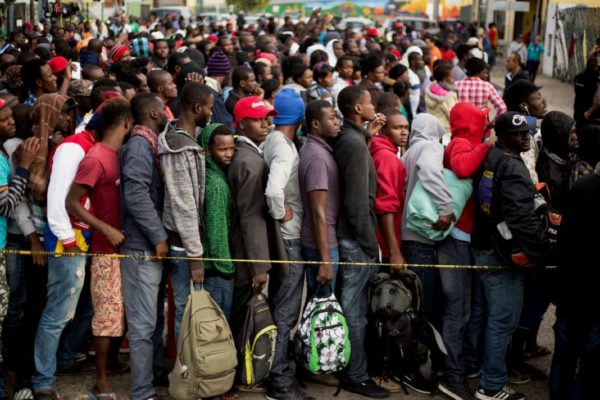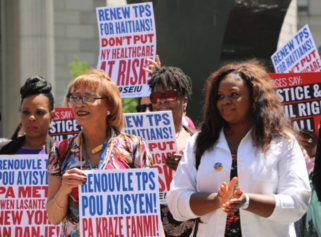
Time is running out for thousands of Haitian and Somali immigrants who are at risk of being deported from the U.S. (Photo by Guillermo Arias/ AFP/ Getty Images)
Though largely seen as an issue affecting Latinos, Black immigrants are often faced with the threat of deportation, too. That’s why the Black Alliance for Just Immigration is now fighting to aid the nearly 50,000 Haitians and 4,000 Somali immigrants at risk of being ousted from the U.S.
The advocacy group, comprised of Black Americans and Black immigrants from Africa, Latin America and the Caribbean, has since called on lawmakers to halt the mass deportation of migrants from both nationalities. The extraditions have left BAJI activists anxious for those who fled dangerous situations in their home countries — only to be sent back there.
The re-designation of Temporary Protected Status, or TPS, for Haitians living in the U.S. is scheduled for May 23, so local, state and federal campaigns have been working round the clock to ensure that protected status is granted. Organization members expressed worry that Haitian immigrants living in Florida, New Jersey and New York would be hit especially hard, as these states house some of the larger populations of the Haitian diaspora.
“Considering the current Haitian migrant crisis on the U.S./Mexico border, along with the trials [post Hurricane Matthew] that continue to impede on the progress of Haiti’s national development, stripping 50,000 Haitian nationals of TPS status prioritizes them for removal and raises major concerns around the readiness of Haiti to handle such a large number of deportees,” BAJI policy manager Nana Brantuo said in a statement.
U.S. Immigration and Customs Enforcement, better known as ICE, also is in the process of removing more than 4,000 Somalis residing in the country, according to Ahmed Isse Awad, Somalia’s U.S. Ambassador. The deportations spell trouble for Somalis across the U.S. but especially for those living in the Midwest, which tends to have high populations of Somalis.
Opal Tometi, Executive Director of BAJI, called the pending deportation of the migrants “a matter of ethics and morality.”
“The current state of affairs in Somalia — a nation that has dealt with decades of political instability and is currently experiencing drought and possibly one of the worst famines in history — is one of fragility, Tometi said. To deport such a large number of nationals while the country is faced with issues of national, economic, and food security is inhumane.”
The Department of Homeland Security is usually tasked with disseminating information regarding mass deportations, members of the advocacy group explained in a press release. However, the agency has yet to release any details on the pending removals, leaving Haitian and Somali immigrants anxious and unsettled.
By highlighting the intersections of race, ethnicity and nationality while discussing the ways in which the immigration system is biased against Black immigrants in the U.S., BAJI ultimately hopes to shift the mainstream narrative surrounding immigration.


